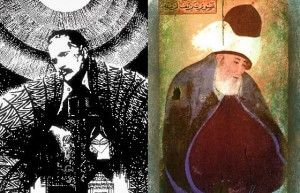The Living Spirtual Chain between Rumi and Iqbal
Among all Persian Masnavis, Rumi’s Masnavi stands in a league of its own for its literary elegance and popularity. Rumi’s Masnavi is called Masnavi Maanvi respectfully since these are verses of the real world, or Aalim-E-Maana, considering our current world is temporary and unreal.
Rumi left the 6th volume unfinished with an interesting story. A dying man asks Qazi to inherit all his belongings to one of his 3 sons, who is the most idle and lazy. The Qazi asks each son to narrate a story and whoever proves he is the laziest is worthy of entire inheritance.
However their stories never begin. In The last verses, Rumi’s son Sultan Walad pleads him to complete the story, but Rumi respond that his time has come and whoever has divine light shining in his heart, the end of Masnavi will enter his heart on its own.
The reader is left mystified as well as amused, since silence can also be interpreted as that ultimate manifestation of sloth of the sons as they cannot be bothered to utter a word. At the same time, silence (khalwat) is pivotal in Tusawaf, since it hides the secrets that cannot be revealed in words.
Maulana Rumi’s such prophecy that his Masnavi will continue after his death led many poets to write Farsi Masnavi in same style as Mevlana. Notable include Mufti Ilahi Bakhsh Kandhlawi and Maulana Shaykh Muhammad Thanvi. However, besides one exception, I feel that all fall short since other Masnavi appear more like sermon, and lack the elegance and mastery of story-telling that was part and parcel of Rumi’s ingenious style.
The one exception aforementioned is Javed Nama, Allama Iqbal’s persian Masnavi. Iqbal was exceptional scholar with his Doctorate over Islamic Philosophy as well exceptional command over Western Philosophy including Dante, Hegel, Nietzsche and more. In Javid Nama, he takes a spiritual journey in guidance of Rumi. Iqbal calls himself by name ‘Zinda Rood’, loosely translated as a ‘live steam of water’.
Allama also ended Javed Nama by acknowledges has has solved many riddles of Self [Khudi], but there is one point that is beyond words. The more he tries to explain it the more it tangles. Iqbal asks his son Javed to find it in the Aah-e-Seher (prayer or ode of morning). Iqbal, like his mentor, also left an open ending, for Secrets of Self are not merely words of book.
There is an interesting event related to spiritual link between Iqbal and Rumi. Allama didn’t let mystical events during his life shared. These became evident via narratives of his housekeeper Ali Bakhsh who remained close to his entire life, see Mevlana Rumi visit Allama Iqbal – Story narrated by Dr. Javid Iqbal. It is also said that one night while he was in remembrance of God the spirit of Rumi appeared to him, who asked Iqbal to write Masnavi in Persian. Iqbal replied that he knows little Persian to commit such hefty job. Rumi gave him a cup to drink which liberates Iqbal thoughts and result was Javid Nama.




